Fleurs du Mal Magazine


Or see the index
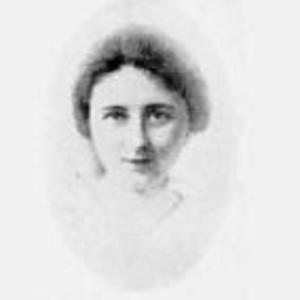
Bluebird
there’s a bluebird in my heart that
wants to get out
but I’m too tough for him,
I say, stay in there, I’m not going
to let anybody see
you.
there’s a bluebird in my heart that
wants to get out
but I pour whiskey on him and inhale
cigarette smoke
and the whores and the bartenders
and the grocery clerks
never know that
he’s
in there.
there’s a bluebird in my heart that
wants to get out
but I’m too tough for him,
Lesbia Harford
(1891-1927)
Bluebird
• fleursdumal.nl magazine
More in: Archive G-H, Archive G-H, Feminism, Harford, Lesbia, Workers of the World
Pauline Peyrade: “L’Âge de détruire”, une tragédie en prose
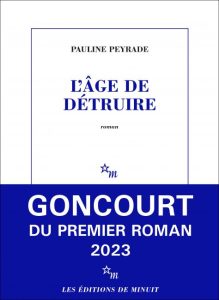
Pauline Peyrade est née en 1986. Elle est l’auteure de sept pièces de théâtre aux Solitaires intempestifs – jouées et traduites en sept langues. Elle a reçu le prix Bernard-Marie Koltès pour Poings en 2019 et le Grand Prix de Littérature dramatique Artcena pour À la carabine en 2021. L’Âge de détruire est son premier roman pour lequel elle obtient le Goncourt du premier roman en 2023.
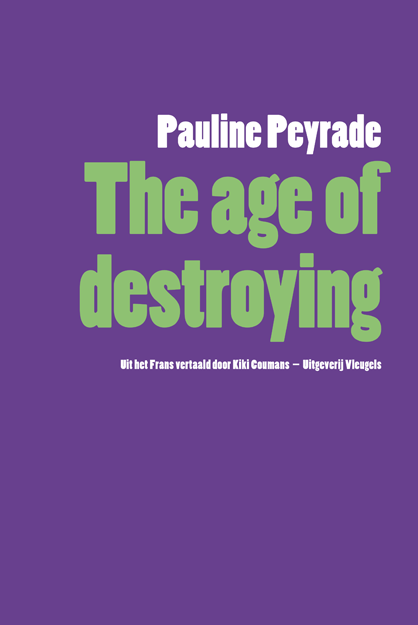
Bibliographie (extrait) :
* Ctrl-X suivi de Bois impériaux, théâtre (Les Solitaires intempestifs, 2016).
* Poings, théâtre (Les Solitaires intempestifs, 2017).
* Portrait d’une sirène suivi de Princesse de pierre – Rouge dents – Carosse (Les Solitaires intempestifs, 2019).
* A la carabine suivi de Cheveux d’été, théâtre (Les Solitaires intempestifs, 2020).
* L’Age de détruire, roman (Minuit, 2023).
Pauline Peyrade
L’Âge de détruire
2023
160 pages
ISBN: 9782707348197
Editions de Minuit
€ 16.00
Pauline Peyrade
The age of destroying
2023
Vertaling: Kiki Coumans
120 pagina’s
ISBN: 978 94 93186 90 3
Uitgeverij Vleugels
€ 24,50
• fleursdumal.nl magazine
More in: - Book News, - Bookstores, Archive O-P, Awards & Prizes
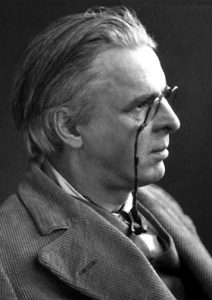
‘Easter 1916’.
Too long a sacrifice
Can make a stone of the heart.
O when may it suffice?
That is Heaven’s part, our part
To murmur name upon name,
As a mother names her child
When sleep at last has come
On limbs that had run wild.
What is it but nightfall?
No, no, not night but death;
Was it needless death after all?
W.B. Yeats
(1865—1939)
‘Easter 1916’
• fleursdumal.nl magazine
More in: *War Poetry Archive, Archive Y-Z, Archive Y-Z, Yeats, William Butler
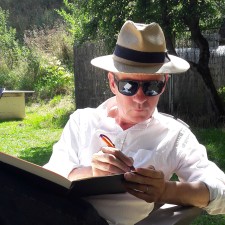
Nostalgie
Jouw zwijgen vult mijn leegte niet.
Er komt geen eind aan het verdriet.
Hoe vaak je Heideggèr of Héraclite
deconstrueren kan, ik weet het niet.
Er komt geen eind aan het verdriet.
Jouw zwijgen vult mijn leegte niet.
Paul Bezembinder
Nostalgie
Gedicht
• fleursdumal.nl magazine
More in: Archive A-B, Archive A-B, Bezembinder, Paul
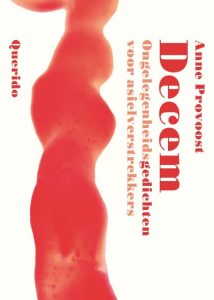 Een jongeman meent zich alles nog te herinneren: hij stapte in een bootje op zoek naar een land met een tandarts, zijn vrouw bleef in het water achter en werd door vissers begraven, en er was ook nog ergens een kind.
Een jongeman meent zich alles nog te herinneren: hij stapte in een bootje op zoek naar een land met een tandarts, zijn vrouw bleef in het water achter en werd door vissers begraven, en er was ook nog ergens een kind.
Door de shock verliest hij het zicht op de gebeurtenissen, maar zijn verblijfsvergunning hangt af van hoe geloofwaardig zijn rouw klinkt.
In een reeks ongelegenheidsgedichten veegt hij zijn ondervragers met cynische precisie de mantel uit.
Decem
Ongelegenheidsgedichten voor asielverstrekkers
Auteur: Anne Provoost
Poëzie
Bindwijze: Paperback
80 pagina’s
Druk 1e
Taal: Nederlands
Uitgeverij: Querido
NUR: 306
Paperback
ISBN: 9789025317836
Publicatiedatum: 26-09-2024
Prijs: € 20,00
• fleursdumal.nl magazine
More in: #Modern Poetry Archive, - Book News, - Bookstores, Archive O-P, Archive O-P

O, als ik dood zal zijn
“O, als ik dood zal, dood zal zijn
kom dan en fluister, fluister iets liefs,
mijn bleeke ogen zal ik opslaan
en ik zal niet verwonderd zijn.
En ik zal niet verwonderd zijn ;
in deze liefde zal de dood
alleen een slapen, slapen gerust
een wachten op u, een wachten zijn.”
En schokkende het grote zwichten
en armen die in vertwijfeling slaan,
een wringen omhoog, een biddend reiken,
een klemmen en jammerend laten gaan.
En een hoofd verwordende en bedolven
in der snikken en in der haren nacht,
wond over ondoorgrondlijke stroomen
vervreemd en doodswit opgebracht.
En een stem verwezen en ingezonken
en die nog stervende aanbad:
ik heb zoo zielsveel van je gehouden,
ik heb je zoo lief, zoo lief gehad.
J.H. Leopold
(1865-1925)
O, als ik dood zal zijn
• fleursdumal.nl magazine
More in: Archive K-L, Archive K-L, Leopold, J.H.

Na de dag
Het licht heeft je gezicht verweerd
en de marok wil met je aan de haal,
barok wordt rococo, de wijn creëert
de tralies voor de panter van de taal.
De wind steekt op, sirocco of simoem,
rhizomen worden schaars, de gentiaan
verdorst, de iris wordt een zonnebloem
en aan de hemel dient de maan zich aan.
Paul Bezembinder
Na de dag
Gedicht
Paul Bezembinder studeerde theoretische natuurkunde in Nijmegen. In zijn poëzie zoekt hij vooral in klassieke versvormen en thema’s naar de balans tussen serieuze poëzie, pastiche en smartlap. Bij uitgeverij Leeuwenhof (Oostburg) verschenen de bundels Gedichten (2020), Parkzicht (2020) en Duizelingen (2022). Website: www.paulbezembinder.nl.
• fleursdumal.nl magazine
More in: Archive A-B, Archive A-B, Bezembinder, Paul
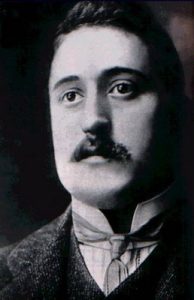
Il y a
Il y a des petits ponts épatants
Il y a mon cœur qui bat pour toi
Il y a une femme triste sur la route
Il y a un beau petit cottage dans un jardin
Il y a six soldats qui s’amusent comme des fous
Il y a mes yeux qui cherchent ton image
Il y a un petit bois charmant sur la colline
Et un vieux territorial pisse quand nous passons
Il y a un poète qui rêve au ptit Lou
Il y a un ptit Lou exquis dans ce grand Paris
Il y a une batterie dans une forêt
Il y a un berger qui paît ses moutons
Il y a ma vie qui t’appartient
Il y a mon porte-plume réservoir qui court, qui court
Il y a un rideau de peupliers délicat, délicat
Il y a toute ma vie passée qui est bien passée
Il y a des rues étroites à Menton où nous nous sommes aimés
Il y a une petite fille de Sospel qui fouette ses camarades
Il y a mon fouet de conducteur dans mon sac à avoine
Il y a des wagons belges sur la voie
Il y a mon amour
Il y a toute la vie
Je t’adore
Entre Bar-sur Aube et Troyes,
le 5 avril 1915
Guillaume Apollinaire
(1880 – 1918)
Il y a
Poèmes à Lou
• fleursdumal.nl magazine
More in: #Editors Choice Archiv, Apollinaire, Guillaume, Archive A-B, Archive A-B, Guillaume Apollinaire, Surrealism, Surrealisme
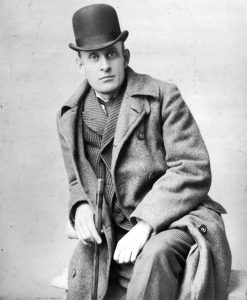
At the Door
I thought myself indeed secure,
So fast the door, so firm the lock;
But, lo! he toddling comes to lure
My parent ear with timorous knock.
My heart were stone could it withstand
The sweetness of my baby’s plea,—
That timorous, baby knocking and
“Please let me in,—it’s only me.”
I threw aside the unfinished book,
Regardless of its tempting charms,
And opening wide the door, I took
My laughing darling in my arms.
Who knows but in Eternity,
I, like a truant child, shall wait
The glories of a life to be,
Beyond the Heavenly Father’s gate?
And will that Heavenly Father heed
The truant’s supplicating cry,
As at the outer door I plead,
“‘T is I, O Father! only I”?
Eugene Field
(1850 – 1895)
At the Door
• fleursdumal.nl magazine
More in: Archive E-F, Archive E-F, Field, Eugene

Ik ben een zwerver overal
Ik ben een zwerver overal,
een doler en een vagebond
en een, die uit zich zelf geen pad,
geen ommekeer en geen uitweg vond.
Ik ben een napraatpapegaai,
ik ben een open spiegelrond,
des Eeuwigen gesproken woord,
het hapert in mijn stamelmond.
J.H. Leopold
(1865-1925)
Ik ben een zwerver overal
Oostersch IV
• fleursdumal.nl magazine
More in: Archive K-L, Archive K-L, Leopold, J.H.

My window pane is broken
My window pane is broken
Just a bit
Where the small curtain doesn’t
Cover it.
And in the afternoon
I like to lie
And watch the pepper tree
Against the sky.
Pink berries and blue sky
And leaves and sun
Are very fair to rest
One’s eyes upon.
And my tired feet are resting
On the bed
And there’s a pillow under
My tired head.
Parties and balls and books
I know are best
But when I’ve finished work
I like to rest.
Lesbia Harford
(1891-1927)
My window pane is broken
• fleursdumal.nl magazine
More in: Archive G-H, Archive G-H, Feminism, Harford, Lesbia, Workers of the World
Be blown away by Van Gogh’s most spectacular paintings in a once-in-a-century exhibition.
Walk with a pair of lovers beneath a starry night. Look up at swirling clouds and cypress trees swaying in the wind. Stay a little while in Van Gogh’s favourite park, the ‘Poet’s Garden’, or under a shady tree in Saint-Rémy.
 The National Gallery is bringing together the most loved of Van Gogh’s paintings from across the globe, some of which are rarely seen in public. They will be paired together with his extraordinary drawings.
The National Gallery is bringing together the most loved of Van Gogh’s paintings from across the globe, some of which are rarely seen in public. They will be paired together with his extraordinary drawings.
Over just two years in the south of France, Vincent van Gogh revolutionised his style in a symphony of poetic colour and texture. He was inspired by poets, writers and artists. We look at this time in Arles and Saint-Rémy as a decisive period in his career. His desire to tell stories produced a landscape of poetic imagination and romantic love on an ambitious scale.
See up-close his ‘Starry Night over the Rhône’ (1888, Musée d’Orsay) and ‘The Yellow House’ (1888, Van Gogh Museum), as well as our own ‘Sunflowers’ (1888) and ‘Van Gogh’s Chair’ (1889), among many others and celebrate the 200th birthday of Van Gogh’s ‘Poets and Lovers’.
Van Gogh: Poets and Lovers
14 September 2024 – 19 January 2025
The National Gallery London
The National Gallery
Trafalgar Square
London
WC2N 5DN
• fleursdumal.nl magazine
More in: Archive G-H, Exhibition Archive, FDM in London, Vincent van Gogh, Vincent van Gogh
Thank you for reading Fleurs du Mal - magazine for art & literature